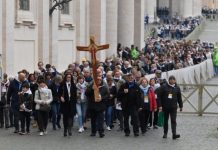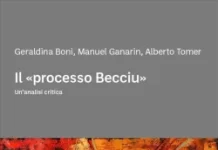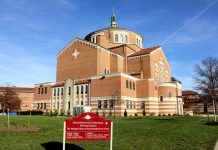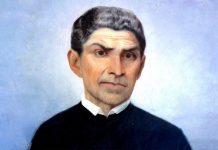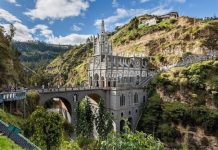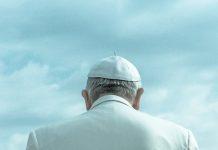In his first interview with the PIME magazine “Mondo e Missione,” Most Rev. Stephen Chow Sau-yan talks about the challenges of his ministry in a city struggling with Beijing’s increasingly harsh crackdown.
Newsroom (10/02/2022 10:15 AM Gaudium Press) Bishop Stephen Chow Sau-yan, SJ, was consecrated bishop of Hong Kong on 4 December 2021 in the Cathedral of the Immaculate Conception. He replaced Most Rev. Michael Yeung Ming-cheung, who passed away in 2019.
The mission of the 62-year-old Jesuit is particularly hard at present given the deep divisions caused by Beijing’s increasingly tight grip on Hong Kong, with arrests and other forms of repression against democratic freedoms in the name of “national security.”
“I find it unacceptable that human dignity is ignored, trampled upon or discarded. God gave us dignity when He created us in His image and likeness. Therefore, it is universal because it comes from God’s love,” the new bishop of Hong Kong stressed.
“I am not bound by public opinion; otherwise, I would not be free to discern God’s will and enjoy inner freedom,” he said. “Mine is a balancing act and I find this stimulating. I am not a diplomat; no bishop is. Of course, sometimes we have to be diplomatic, but my main concern is to discern God’s will.”
In the interview, education and the commitment to human rights take centre stage, as they have in the prelate’s human journey since he was young.
“I became a member of Amnesty International before 1989,” he noted, “even if now I am no longer in it. The incidents of 1989 (the Tiananmen Square movement and its violent repression) affected me very much. They put me in touch with my identity as a Chinese. My personal story and that of the people of China are linked by that event.”
Bishop Chow was educated in Ireland and the United States. “During the many years I spent abroad I learnt the importance of culture. At Harvard, in particular, I understood how it impacts our lives. That is why I now attach great importance to what we create.”
“Culture,” he notes, “can be subversive.” Indeed, “there is the idea that reality is not a fact, but is constructed, that we build together. Educators, in particular, are ‘co-builders’ with young people. The Church should also be like that, working with new generations to build the future together.”
When asked about the difficulties and challenges faced by young people’s education in Hong Kong following the introduction of the National Security Law, on 1 July 2020, Bishop Chow said: “We are in a different phase. We must be careful not to get our children, our students and schools into trouble. Our main task is to protect students. As educators we hope that they can develop independent thinking, not just within a pre-established scheme. We hope that they will be able to have more perspectives, so that they can appreciate differences and come to terms with reality.”
Indeed, “We need to understand what is legal and what is not. It is our duty to help them understand the situation and at the same time help them think. Some people in academia are not evenly balanced. Either they are rigidly conservative or neurotically liberal. Such extremes are not healthy.”
Regrettably, “Many experienced teachers have emigrated.” At present, “It is not easy to hire teachers and principals. Several professionals, such as social workers and psychologists, have also left. This is another reality that we have to face.”
The new bishop of Hong Kong has a few things to say to young people disenchanted with the current political situation. “I would like to say: ‘Be like a giraffe with your feet on the ground and a vision of the future.’ But you can’t have all feet on the ground at once. When a giraffe moves, one is in the air. A vision is needed. We must understand the present and the context. Do not look at walls, look to the future.”
What is more, “I would like to tell young people to imagine the kind of Church they want, the kind of world they wish for, what our Hong Kong ought to be like; and share their vision with others, not just listen to those who think like them, for this means ending up in the same dead ends. We must listen to different people, even those with whom we don’t get along. Only this way will it be possible to have more perspectives.”
Lastly, with respect to foreigners leaving Hong Kong, he is worried about the future and the uncertainty, which the missionaries themselves feel. According to Bishop Chow, “Hong Kong must continue to be an international city. It is not possible to get rid of expats.”
“As men and women religious, we must learn to work with the government and find as much leeway as possible. This doesn’t mean we can no longer be critical. We are here as prophets, but with the humility of dialogue. I truly believe that missionaries have a place in the Church in Hong Kong. We appreciate their role and what they have done, and we will do our best to keep them here,” he concluded.
(via Aisanews.it)
Compiled by Raju Hasmukh








